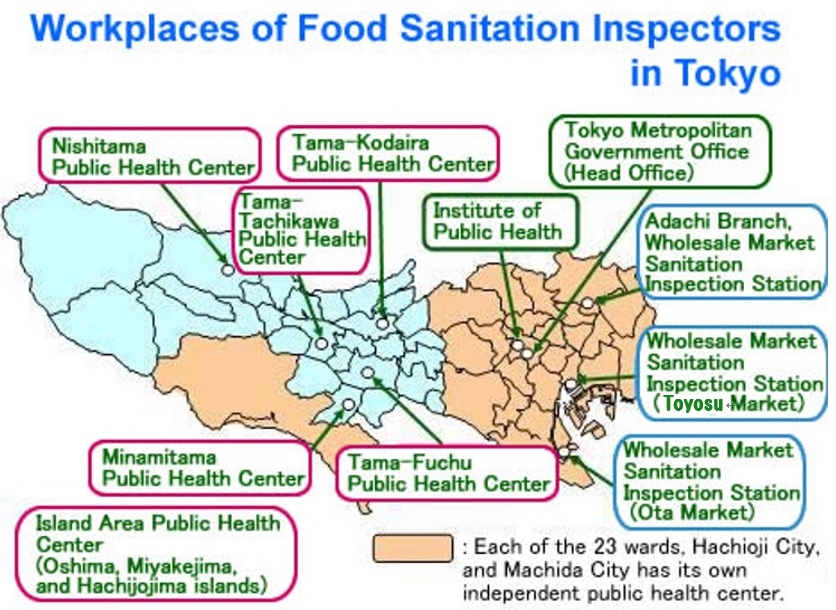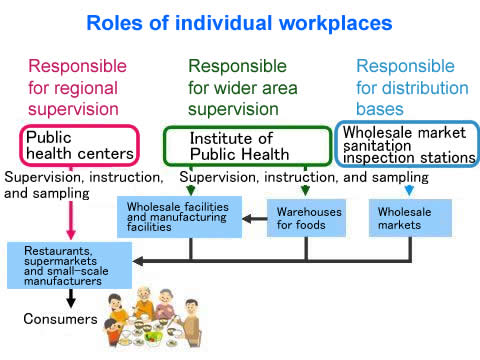Tokyo Food Safety Information Center » Tokyo Metropolitan Government initiatives and systems » Introduction of Duties of Food Sanitation Inspectors and Veterinarians
» Overview of Duties of Food Sanitation Inspectors and VeterinariansOverview of Duties of Food Sanitation Inspectors and Veterinarians
The duties of the Tokyo Metropolitan Government’s Food Sanitation Inspectors and Veterinarians are explained in a Q-&-A format:
Q1. What are the duties of the Food Sanitation Inspectors?
For the citizens of Tokyo, securing food safety is very important and of great concern. Based on the Food Sanitation Law, and other laws and regulations, the Food Sanitation Inspectors perform various duties, including the following ones:
1. Licensing business facilities such as restaurants
Based on the Food Sanitation Law and the Tokyo Metropolitan ordinances, business licenses and/or notifications are required to operate a restaurant, and to produce and sale foods. Food Sanitation Inspectors carry out on-site investigations to confirm whether these business facilities meet the licensing standards.
2. Monitoring and instructing business facilities
The Food Sanitation Inspectors are given some authority in accordance with the Food Sanitation Law, including:
- Authority for entry: They have the authority to enter business facilities for the purposes of observation, instruction, investigations, and inspections, etc.
- Authority for takeout: They have the authority to enter business facilities and take out minimum quantities of samples of foods, additives, and so forth, that are necessary for tests and examinations.
When visiting facilities, the Food Sanitation Inspectors perform observations and provide instructions to confirm whether the foods are produced in conformity with the standards, whether the foods are handled in hygienic manners including temperature control, and whether the facilities and equipment are hygienic.
3. Investigation into food poisoning, etc.
If a food poisoning incident or an accident derived from foods occurs, the Food Sanitation Inspectors carry out investigations with the cooperation of the persons concerned, and with doctors, in order to prevent the damage from spreading and the incident/accident from recurring, through means of taking administrative measures, including: the prohibition of sales of the causing foods, and the suspension of business operations of the facility causing the food poisoning.
4. Food inspection
The Food Sanitation Law defines some standards and criteria for foods and additives to prevent food accidents (Ex.: Coliform group must be negative in milk).
Food Sanitation Inspectors inspect foods and the like, sampled in business facilities, to check whether the standards and criteria are met. If a non-conformity is found as a result of an inspection, the Food Sanitation Inspectors take actions such as prohibition of sales, or disposal, to prevent the food from being distributed in the market.
5. Responses to complaints and inquiries about foods
When Food Sanitation Inspectors receive various complaints and inquiries about foods from the Tokyo citizens, for example, “The candy got moldy”, the inspectors investigate the causes and take measures to prevent recurrence. In order that Tokyo citizens can be provided with safe foods, Food Sanitation Inspectors additionally provide public education about food sanitation through holding training courses for food-related business operators.
Q2. What are the duties of Veterinarians in the public hygiene field?
In addition to the duties of the Food Sanitation Inspectors described in Q1 above, Veterinarians in the public hygiene field have other duties that can be performed only by veterinarians as follows:
1. Prevention of rabies and welfare and management of animals
Based on laws and regulations, including the Cruelty to Animal Act, these Veterinarians spread and enlighten about the spirit of animal protection, supervise and instruct animal-handling businesses (pet shops), and in addition, among other actions, protect and manage animals, and furthermore seek to prevent and investigate zoonosis (diseases which can be transmitted to humans from animals).
2. Slaughter inspection and meat hygiene
Based on applicable laws and regulations, including, the Slaughterhouse Act, Veterinarians inspect individual cows, pigs and other animals brought to slaughterhouses for meat production in order to ensure meat safety. Additionally, they provide supervision and instruction with regard to the facilities in slaughter houses and meat markets.
Q3. How many Food Sanitation Inspectors do we have all over Japan?
In order to secure food safety, Food Sanitation Inspectors are playing active roles not only in Tokyo but also in various places such as local governments and quarantine stations all over Japan.
Food Sanitation Inspectors in Japan
| All over Japan (prefectural governments, cities designated by governmental ordinance, core cities, and cities operating public health centers) | Approx. 8,400 inspectors |
| Ministry of Health, Labor and Welfare (including quarantine stations) | Approx. 400 inspectors |
| Tokyo Metropolitan Government | 325 inspectors |
| Special wards, Hachioji City, and Machida City | 469 inspectors in total |
* As of FY 2018
Q4. What kind of framework do you have in Tokyo for food hygiene supervision?
Considering the regional characteristics of Tokyo, as the area of Japanese largest consumption where many foods are gathered and distributed, we prepare the “Tokyo Metropolitan Food Hygiene Supervision Plan” every fiscal year, based on the Food Sanitation Act, in order to prevent occurrence of accidents and the like caused by foods. Based on this plan, Food Sanitation Inspectors in Tokyo visit facilities such as restaurants, food factories, and food stores in order to supervise and provide instruction in regard to the methods for food handling and facility sanitation control, and also perform food sampling tests.
The workplaces of the Food Sanitation Inspectors in Tokyo and the roles of the individual places are as shown below:

